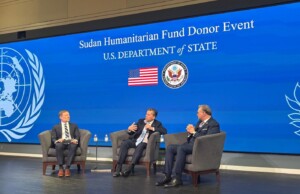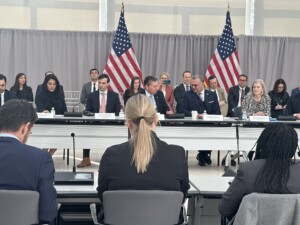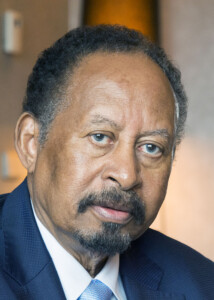Mass response to Sudan’s ‘March of the Millions’
Millions of people demonstrated all over Sudan yesterday to demand civilian rule, peace, retribution for the protestors killed during demonstrations, better living conditions, and dismantling of remnants of the Al Bashir regime. One demonstrator was shot dead. Dozens were wounded.
 The March of the Millions in El Fasher, capital of North Darfur (RD)
The March of the Millions in El Fasher, capital of North Darfur (RD)
Millions of people demonstrated all over Sudan yesterday to demand civilian rule, peace, retribution for the protestors killed during demonstrations, better living conditions, and dismantling the remnants of the Al Bashir regime. One demonstrator was shot dead. Dozens were wounded.
The Sudan Doctors Central Committee announced yesterday evening that Ali Mohamed (33) was fatally shot in the chest during the marches in Omdurman. At least 44 others sustained bullet wounds or were injured by tear gas. Dozens of others were beaten or stabbed.
Information Minister Feisal Mohamed Saleh confirmed yesterday evening that a demonstrator was killed in Omdurman and dozens were wounded. He mentioned that more people were injured, in other placed, he said, but he could not specify the numbers.
A “transparent investigation” will be conducted to determine who is responsible for the violence. The perpetrators of the "unacceptable abuses" will be punished, he said.
The police fired tear gas at the demonstrators in several areas of Khartoum. Joint security forces prevented the demonstrators from reaching the army command in Khartoum, and parliament in Omdurman.
The demonstrations started in different districts of Khartoum. The demonstrators held Sudanese flags, pictures of protestors killed during earlier demonstrations, and banners with slogans of the revolution.
The largest rally took place at Africa Road (popularly called Airport Road) in Khartoum, as demonstrators gathered there from various districts in south and central Khartoum. The crowd filled the entire road, from the beginning to El Azhari district.
Speakers emphasised that the goal of the Marches of the Millions is to correct the course of the revolution, and not to topple the government. They called for “the completion of the power structures” by appointing civilian governors and forming the Legislative Council, prosecution of leading figures of the deposed Al Bashir regime, peace, addressing the living conditions of the Sudanese people, and retribution for the protestors killed during the demonstrations.

Darfur
Hundreds of thousands of people participated in demonstrations in the capitals of the five Darfur states and other towns in Darfur. They demanded a just peace, disarmament of militias, and achieving the goals of the revolution.
Demonstrations took place in many camps for the displaced as well, including Kalma, Ardamata, Abushouk, El Hamidiya, Zamzam, Murnei, Ronga Tas, and Mukjar.
The demonstrators demanded security, disarmament of the militias, dismissal of the military governors, and corrections of the course of the revolution.
The coordination of the Resistance Committees in Ed Daein, capital of East Darfur, submitted a memorandum to the acting state governor demanding the dismissal of 13 officials, including directors of ministries. The memorandum also called for a restructuring of the Economic Committee to include the forces of the revolution.
The memorandum demanded the formation of a committee to remove ‘empowerment’ (tamkin)*, and recover stolen endowment funds. It also calls for the formation of a legal committee to investigate suspicious or apparently fraudulent rezoning projects. The memorandum gave the governor of the state 72 hours to implement the demands. It threatens with escalation in the event that the demands are not met.
In El Geneina in West Darfur, the Resistance Committees delivered a memorandum to the governor, demanding to completion of the revolution, and retribution for the protestors killed during demonstrations. They also called for better border control to prevent smuggling, and publication of the results of the investigation into the violent events in Kerending camp at the end of 2019, when more than 80 people were killed and at least 47,000 displaced. They seek the dismissal of remnants of the Al Bashir regime, guarantees that this year’s crops can be harvested, and more progress in dismantling ‘empowerment’ (tamkin)* and recovering stolen funds. The memorandum gave the governor of West Darfur 72 hours to respond to the demands.
The coordination of the Resistance Committees in North Darfur called for achieving a just and comprehensive peace that addresses the roots of the conflicts in the country since independence. In a statement it called for the establishment of rule of law, reform, a handover to the ICC of all those indicted, the truth about what happened during the violent dismantling of the Khartoum sit-in on June 3, 2019, and bring all those responsible for violence to justice.
It also seeks a state committee for the removal of empowerment (tamkin)*, and an immediate investigation into corruption in the state and the El Mawasir Market Ponzi scheme. The North Darfur Resistance Committees want civilian power structures in the state as soon as possible, but not established by partisan quotas. The memorandum calls for a fundamental restructuring of the military and the security institutions, and a single national army under the full supervision of a civilian cabinet.
On behalf of 174 camps of the displaced in Darfur, the head of camp Kalma near Nyala, Ishag Mohamed, presented the demands of the displaced to the AU-UN peacekeeping mission Unamid. These demands include disarmament of the militias, individual and collective compensation, access for international humanitarian organisations to Darfur, and handing over those indicted to the International Criminal Court (ICC).
Mohamed said that the displaced will remain in the camps until promises are kept with regard to safety, a safe return to their land, and the establishment of civilian rule. The demonstrators carried banners underlining their demands.
'Peace, justice, and retribution'
Hundreds of thousands of demonstrators took to the streets in Atbara in River Nile state. They delivered a memorandum with demands to the Forces for Freedom and Change (FFC), among them a correction of the course of the revolution, the appointment of civilian governors, the formation of the Legislative Council, and achieving peace, justice, and retribution.
In Dongola in Northern State hundreds of thousands protestors gathered to demonstrate. A statement issued by the Resistance Committees, the Dongola Revolutionaries and the Kush Liberation Movement, demanded that all the forces of the revolution should adhere to what was stated in the Constitutional Document. They called for a swift appointment of civilian governors, forming the Legislative Council, and improving the economic situation and the living conditions of the people.
El Gedaref, Kassala, Port Sudan and other eastern Sudanese cities and towns witnessed hundreds of thousands of demonstrators as well. The organisers quoted from a memo during their speeches. That memo specifies state-specific demands, which include an end to the shortages of water, and an end to corruption and 'empowerment'*.
The Resistance Committees in Port Sudan demanded that perpetrators of all crimes be brought to justice, including those responsible for the massacre at the sit-in in front of the army command last year, and the massacre in Port Sudan on January 29, 2005. They demanded transitional justice, peace, peaceful coexistence and the development of mechanisms for dialogue, and the dismissal of employees affiliated with the deposed regime who are still working in localities and ministries.
They also condemned the new bread prices that were imposed in May "without consulting the revolutionary forces and the Resistance Committees". Over the past months there have been serious shortages of bread in Port Sudan. The government's lack of commitment led to the return of flour smuggling, manipulation of food prices, and the closure of bakeries. The activists claimed the Red Sea state government is not able to face the crises, they said. They also attributed the crises to manipulation of affiliates of the former regime, demanding their dismissal as officials.

'Correct the course of the revolution'
Hundreds of thousands of people gathered in the streets of Kordofan, Blue Nile state, Sennar, White Nile state, and El Gezira to participate in Marches of the Millions.
One of the largest rallies took place in El Obeid, capital of North Kordofan.
Similar demonstrations were organised in Kadugli, El Nahud, El Fula and other cities in the state.
In Blue Nile state, tens of thousands demonstrated in Ed Damazin and neighbouring Roseires.
In central Sudan, rallies and marches were organised in Wad Madani in El Gezira, Kosti in White Nile state, Singa in Sennar and other towns and villages. At all these demonstrations, speakers stressed that the goal of the marches is to correct the course of the revolution, and not to topple the government.
Government statement
In his statement on Tuesday evening, Information Minister Feisal Mohamed Saleh said that the government will definitely meet the demands of the demonstrators. It “will seriously work, from today onwards, to translate these demands into government decisions”.
The government will further continue the dialogue with “the brothers of the armed rebel movements” to conclude the peace negotiations, so that Sudan can focus on development, he said.
On Monday, Prime Minister Abdallah Hamdok had already pledged to put the transitional period “back on course”, and implement all the demands that were mentioned in the memoranda of the Families of the Victims of the December Revolution, and the Resistance Committees within two weeks.
* Empowerment (tamkin) is the term with which the government of President Omar Al Bashir, ousted in April last year, supported its affiliates in state affairs by granting them far-going privileges, including government functions and the setting-up of various companies.
Radio Dabanga’s editorial independence means that we can continue to provide factual updates about political developments to Sudanese and international actors, educate people about how to avoid outbreaks of infectious diseases, and provide a window to the world for those in all corners of Sudan. Support Radio Dabanga for as little as €2.50, the equivalent of a cup of coffee.












 and then
and then